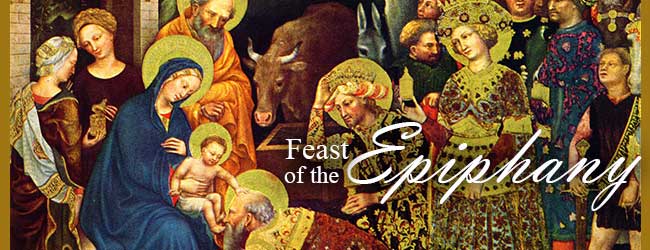Epiphany Traditions

Epiphany is a Feast Day within the Church’s liturgical celebration of Christmas. In the current Western tradition, we associate it with the “Visit of the Magi,” or visitors from the East recounted in Matthew’s Gospel. (Mt 2:1-12). Epiphany is traditionally celebrated the 12th day after Christmas, (Twelfth Night), January 6th. In the Catholic dioceses of the United States this feast has been moved to the Sunday after January 6.
Epiphany takes its name from the Greek epiphania, a manifestation. Jesus, born quietly in Bethlehem’s stable, is revealed, or made manifest, as the Son of God. In the recognition of Him by the Magi, the Christ, He is revealed to the “nations.” (see, for example, Is 42:6; Is 60: 1-6; and Psalm 72:11)

In the Catholic tradition, November is the month of the Poor Souls in Purgatory. It begins with the Solemn Feast of All Saints (November 1) and the Commemoration of All Souls (November 2). However, the season to pray for the souls in purgatory is always.
It is helpful to reflect during this season of the Resurrection – the fifty days of Easter – on our duty to pray for those who are undergoing the purification required to ready them for heaven. (Catechism of the Catholic Church, no. 1030) Although they live in the sure hope that they will see God in everlasting life, the souls in Purgatory count on our prayers. They are helpless to assist themselves.

Our Lord Jesus Christ announces, “the Kingdom of God is at hand!” What does this mean, and how do we respond? In a number of places, Jesus, (Mt 4:17, Mk 1:15) and, in anticipation of Jesus, St John the Baptist, (Mt 3:2) calls us to repentance because of the arrival of the Kingdom. In the citation from Mark’s Gospel, Jesus says that “The time is fulfilled, and the Kingdom is at hand, so repent, and believe in the Gospel.” In Luke, the work of announcing the Kingdom is entrusted to the disciples.
But what happened to get the Kingdom “started?”

We are not angels.
As human beings we have a body, flesh and blood, and an immortal soul. Our bodies and souls are created in the first moment of our life, at conception. Our souls will live forever. Our bodies will decay at death, but ‘rise again’ at the Last Day.
Each of us - as a unity of body and soul - are unique and ‘one of a kind.’ As unrepeatable individuals, we do no reincarnate into some other person or being: this body ‘goes with’ this soul forever. And our souls are each unique and individual. We are not part of some great universal soul.

Soon the Liturgical Season of Lent will begin, and it is time to think about the resolutions that will help us grow in holiness. The traditional triad of Prayer, Fasting, and Almsgiving are a path of purification for participating more fully in the Lord’s Passion and Resurrection which will be our principal meditation in Holy Week.
 Prayer is for every season. Worthy participation in Holy Mass is the source and summit of our Catholic tradition. Perhaps we can find a Mass early in the morning before work, or during the lunch hour. Some parishes may add an evening Mass during Lent. Mass during the week can bring a greater appreciation to our experience of Sunday Mass. The Rosary or some other devotional prayer(s) such as the Divine Mercy Chaplet or the Stations of the Cross can aid our meditation on Christ’s life, death, and Resurrection.
Prayer is for every season. Worthy participation in Holy Mass is the source and summit of our Catholic tradition. Perhaps we can find a Mass early in the morning before work, or during the lunch hour. Some parishes may add an evening Mass during Lent. Mass during the week can bring a greater appreciation to our experience of Sunday Mass. The Rosary or some other devotional prayer(s) such as the Divine Mercy Chaplet or the Stations of the Cross can aid our meditation on Christ’s life, death, and Resurrection.
